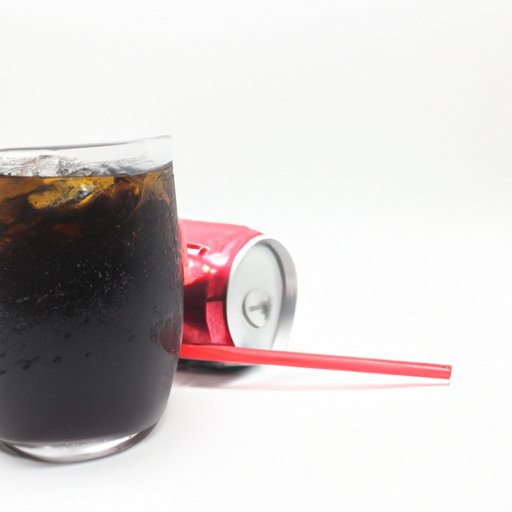
I. Introduction
Diet Coke is one of the most popular sodas in the world. It’s enjoyed by millions of people every day, but do you know how much caffeine is in your favorite beverage? Understanding caffeine content is important for maintaining a healthy lifestyle, which is why in this article we will explore the amount of caffeine in Diet Coke and the potential side effects of excessive intake.
II. Exploring the Makeup of Diet Coke: Understanding Caffeine Content
Diet Coke is made up of a blend of different ingredients that give it its unique taste. However, the one ingredient that stands out is caffeine. Caffeine is a natural stimulant that is found in coffee, tea, and even some foods. In Diet Coke, caffeine is added to give it that energy-boosting effect. According to Coca-Cola, a 12-ounce can of Diet Coke contains 46 milligrams of caffeine, while a 16-ounce serving has 62 milligrams of caffeine.
When consumed in moderation, caffeine can have a range of benefits, including increased alertness, improved mood, and enhanced cognitive function. However, it’s important to understand that caffeine can have negative effects if consumed in large amounts.
III. The Science Behind Caffeine in Diet Coke: How Much is Too Much?
According to the FDA, the recommended daily intake of caffeine is 400 milligrams per day for healthy adults. However, it’s important to understand that everyone tolerates caffeine differently, and some people may be more sensitive to caffeine than others. The negative consequences of consuming too much caffeine can include jitteriness, anxiety, insomnia, rapid heartbeat, and dehydration.
Caffeine addiction is another potential issue for those who consume too much caffeine. While caffeine addiction is not technically considered a substance addiction like alcohol or drugs, it can cause withdrawal symptoms such as headaches and irritability when you try to quit.
IV. Investigating Popular Beverages: How Does Diet Coke Compare in Caffeine Content?
To understand how much caffeine is in Diet Coke, it’s important to compare it to other popular beverages. For example, a 12-ounce can of Coca-Cola Classic contains 34 milligrams of caffeine, while a 16-ounce cup of coffee contains 200 milligrams of caffeine on average. It’s important to note that some sodas, such as Mountain Dew, contain significantly more caffeine than other sodas.
When choosing your favorite beverage, it’s essential to understand the caffeine content and the potential side effects of consuming too much caffeine, to make the right choice about your beverage consumption.
V. The Dangers of Caffeine: What You Need to Know About Diet Coke
In addition to potential side effects of consuming too much caffeine, there are also concerns about the safety of caffeine consumption, particularly for certain groups such as pregnant women. While the FDA has not established a specific limit for caffeine intake during pregnancy, some studies suggest that excessive caffeine intake during pregnancy can increase the risk of miscarriage and low birth weight
It’s essential to understand the potential consequences of consuming too much caffeine, particularly for sensitive populations, before deciding how much caffeine you should consume.
VI. Navigating the World of Soft Drinks: Is Diet Coke a Safe Choice for Caffeine Seekers?
When it comes to choosing a beverage, many people opt for diet sodas over regular sodas to avoid consuming too much sugar. However, diet sodas may come with their own set of problems. For example, studies suggest that drinking diet soda regularly may increase the risk of obesity and type 2 diabetes.
If you’re looking for a beverage that contains caffeine, there are other options to consider, such as coffee, tea, and energy drinks. However, it’s important to always read the label and understand the caffeine content before consuming any beverage.
VII. Decoding the Label: Understanding Caffeine Information on Diet Coke
If you’re looking to understand the caffeine content in your Diet Coke, the information is readily available on the nutrition label. The label specifies that caffeine is present in the beverage, and it provides the total amount of caffeine per serving size.
To calculate how much caffeine you are consuming, take the amount listed on the label and multiply it by the number of servings you have consumed. This will give you an accurate idea of how much caffeine you are consuming.
VIII. Is Diet Coke Keeping You Awake? A Look at the Caffeine Levels in Popular Soft Drinks.
Here’s a breakdown of the caffeine content in some of the most popular soft drinks in America:
| Beverage | Serving size | Caffeine content |
|---|---|---|
| Diet Coke | 12 fl. Oz | 46 mg |
| Coca-Cola Classic | 12 fl. Oz | 34 mg |
| Mountain Dew | 12 fl. Oz | 54 mg |
| Dr. Pepper | 12 fl. Oz | 41 mg |
As you can see, Diet Coke contains a moderate amount of caffeine when compared to other popular sodas. However, this doesn’t mean that you should consume as much as you want without considering the potential consequences.
IX. Conclusion
Caffeine is a significant component of Diet Coke, and it’s essential to understand the amount and potential consequences of consuming too much of it. While moderate caffeine intake can be beneficial, excessive caffeine consumption can have negative effects. When trying to decide how much caffeine you should consume, it’s necessary to understand the recommended daily intake and any potential health risks.
By understanding the caffeine content of your favorite beverages, you can make informed choices about which drinks are right for you.





